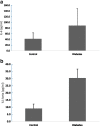Investigation of serum level relationship anti-glutamic acid decarboxylase antibody and inflammatory cytokines (IL1-β, IL-6) with vitamins D in type 2 diabetes
- PMID: 35673456
- PMCID: PMC9167395
- DOI: 10.1007/s40200-021-00956-3
Investigation of serum level relationship anti-glutamic acid decarboxylase antibody and inflammatory cytokines (IL1-β, IL-6) with vitamins D in type 2 diabetes
Abstract
Background: Various factors are involved in the development and progression of diabetes mellitus, from cytokines and autoimmune destruction of pancreatic beta cells to vitamin D.This study aimed to investigate the association of serum levels of anti-glutamic acid decarboxylase (anti-GAD) and inflammatory cytokines with vitamin D in type 2 diabetes (T2D).
Methods: This case-control study was performed on 30 patients with T2D and 30 healthy individuals in Mashhad hospitals in 2020. Lipid profile, creatinine, uric acid, FBS, HbA1c, and blood pressure were recorded. All study variables were measured, particularly serum vitamin D, anti-GAD, and inflammatory cytokine levels in diabetic patients, and the data were compared to those from healthy subjects by performing an appropriate statistical analysis.
Results: Diabetic patients with a mean age of 52.9 ± 10.4 years, including 16 women and healthy individuals with a mean age of 48.5 ± 10.4 years, including 16 women, were studied. BMI level (P = 0.002), systolic blood pressure (P = 0.034), HbA1c, insulin, IL-6, IL1-β, anti-GAD levels, and insulin resistance in diabetic patients were significantly higher than the control group (P = 0.001). The vitamin D level in the control group was significantly higher than in the case group (P = 0.0001). The results showed a significant direct relationship between IL-6, IL-1β, and anti-GAD with HbA1c, FBS, insulin, and insulin resistance. However, there was a significant inverse relationship between IL-6, IL-1β, and anti-GAD with vitamin D.
Conclusions: Inflammatory cytokines and anti-GAD and vitamin D are associated with diabetes, and thus controlling these factors can help improve T2D.
Keywords: Anti-glutamic acid decarboxylase; Inflammation; Inflammatory cytokines; Type 2 diabetes mellitus; Vitamin D.
© Springer Nature Switzerland AG 2021.
Conflict of interest statement
Conflict of interestThe authors declare no conflict of interest, financial or otherwise.
Figures




Similar articles
-
Association of vitamin D and vitamin D receptor gene polymorphisms with chronic inflammation, insulin resistance and metabolic syndrome components in type 2 diabetic Egyptian patients.Meta Gene. 2014 Aug 7;2:540-56. doi: 10.1016/j.mgene.2014.07.002. eCollection 2014 Dec. Meta Gene. 2014. PMID: 25606437 Free PMC article.
-
Association between type 1, type 2 cytokines, diabetic autoantibodies and 25-hydroxyvitamin D in children with type 1 diabetes.J Endocrinol Invest. 2016 Dec;39(12):1425-1434. doi: 10.1007/s40618-016-0514-9. Epub 2016 Aug 19. J Endocrinol Invest. 2016. PMID: 27541155
-
Comparison of adults with insulin resistance (IR) in latent autoimmune diabetes versus IR in glutamic acid decarboxylase antibody-negative diabetes.Ann Acad Med Singap. 2014 Feb;43(2):107-12. Ann Acad Med Singap. 2014. PMID: 24652431
-
Peripheral blood mononuclear cells of patients with latent autoimmune diabetes secrete higher levels of pro- & anti-inflammatory cytokines compared to those with type-1 diabetes mellitus following in vitro stimulation with β-cell autoantigens.Indian J Med Res. 2017 Jun;145(6):767-776. doi: 10.4103/ijmr.IJMR_1563_15. Indian J Med Res. 2017. PMID: 29067979 Free PMC article.
-
Vitamin D, sub-inflammation and insulin resistance. A window on a potential role for the interaction between bone and glucose metabolism.Rev Endocr Metab Disord. 2017 Jun;18(2):243-258. doi: 10.1007/s11154-017-9423-2. Rev Endocr Metab Disord. 2017. PMID: 28409320 Review.
References
-
- Dokken BB. The pathophysiology of cardiovascular disease and diabetes: beyond blood pressure and lipids. Diabetes Spectrum. 2008;21(3):160–165.
-
- Kelley DE, et al. Subdivisions of subcutaneous abdominal adipose tissue and insulin resistance. American Journal of Physiology-Endocrinology And Metabolism. 2000;278(5):E941–E948. - PubMed
-
- Akash MSH, et al. Interleukin-1 receptor antagonist: a new therapy for type 2 diabetes mellitus. J Pharm Sci. 2012;101(5):1647–1658. - PubMed
-
- Hu FB, et al. Inflammatory markers and risk of developing type 2 diabetes in women. Diabetes. 2004;53(3):693–700. - PubMed
LinkOut - more resources
Full Text Sources

